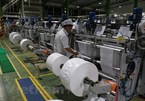 |
| Phan Duc Hieu, deputy director-general of the Central Institute for Economic Management. — Photo mpi.gov.vn |
What’s the role of the national institution in the course of enterprise development?
Reality has shown that if the national economic institution is of low quality, it may have negative impacts on enterprises’ production or business activities. As a result it weakens the competitiveness of the national economy. It will also increase production costs, create more risks and limit workers’ creativity and their dynamism. It will also limit or distort the competitiveness of enterprises’ competitiveness.
When enterprises face difficulties, it means the national economy doesn’t have sufficient resources to invest in them and enable them to achieve high economic growth. In other words, it has negative impacts on mobilising resources and using them efficiently. As a result, it weakens the national economy’s competitiveness and productivity. Consequently, it will lower national economic growth.
Do you have any comments about ongoing national economic reforms?
In the course of carrying out the National Socio-Economic Development Strategy from 2011-2020, the Party, the National Assembly and the Government have launched multiple economic reform programmes and have provided favourable conditions for enterprises to run their businesses and cut production expenses. As a result, the quality of the business environment and competitiveness of the national economy has improved quite a lot and has gained high praise from the international community and the enterprise themselves.
At a recent World Economic Forum (WEF) event held in Vietnạm, all participants praised Vietnam’s major achievements in the Global Competitive Index (GCI). Results from a recent survey conducted by the Vietnam Chamber of Commerce show that the percentage of Vietnamese enterprises who find difficulties in applying for conditional business permits in 2019 reduced to 34 per cent from 42 per cent in 2018.
Are you happy with the ongoing national economic reforms?
The national economic reforms have not yet met the expectations of both enterprises and the people. The quality of our institutional reforms is still at a lower level compared with many other countries in the region and the world. Vietnam’s competitiveness in the Fourth Industrial Revolution ranks sixth among the 10 ASEAN member nations, after Singapore, Malaysia, Thailand, Indonesia and the Philippines. Though the rating of our business environment has improved, there is still a long way for Vietnam to go to become one of the four leading ASEAN member states.
What should Vietnam do improve the quality of its economic reforms?
To build a high-quality economic institution and to become one of the leading members of ASEAN, Vietnam has three important things to do over the next 10 years.
First, Vietnam has to complete its institution – the most important element among the country’s strategic breakthroughs in the upcoming 10 years.
Second, Vietnam should change its goal “to complete and improve the quality of its institution" to “building a high quality institution”. Such a change in the wording means that Vietnam needs to continue its reform process to have an institution which is based on the principle of “management” not “promotion”, development and high labour productivity.
Finally, it is important to define what are the main criteria of a market economy and to ensure enterprises are given the right to decide what they should do and their production strategies.
In other words, the institution must facilitate conditions for enterprises to join or withdraw from the market at their own will while protecting their legal rights and interests in accordance with the law. VNS/Hanoimoi

Vietnam aims to have 2,000 supporting businesses
Prime Minister Nguyen Xuan Phuc has signed a resolution to promote the development of support industries with the aim of having 2,000 enterprises capable of directly supplying parts for multinational corporations in ten years.

Essential guidance beefing up domestic supporting industries
While highly appreciating the solutions and policies set forth in the government’s Resolution No.115/NQ-CP on the development of supporting industries, Truong Thi Chi Binh,